In quotes: Rozena Maart on writing about race
04 May 2021 | Story Carla Bernardo. Photo Christina Morillo / Pexels. Read time 7 min.
As part of the institution’s Dismantling Racism Strategy, the University of Cape Town (UCT) recently hosted a two-day workshop on race, writing and difference, led by one of the world’s leading critical race scholars, Professor Rozena Maart.
The workshop, which took place online on 21 and 22 April, was facilitated by UCT’s Office for Inclusivity & Change (OIC), who work collaboratively on the Dismantling Racism Strategy with the Inclusivity Strategy Working Group and the Anti-Racism Working Group. The director of the OIC, Dr Sianne Alves, provided further information on the strategy.
“These workshops are integral to UCT’s approach and strategy to dismantle racism, which is an institutional strategy driven by the executive of UCT, who have dedicated 2021 as the extraordinary year for dismantling all forms of racism as it affects and influences the higher education sector.
“The Dismantling Racism Strategy aims to bring the university community, and potentially the higher education sector, towards one common understanding of how racism operates and functions within higher education,” said Dr Alves.
The Race Writing workshop was attended by participants from UCT, other South African universities, including the University of the Free State, the University of KwaZulu-Natal and the University of Venda, and international delegates.
It took its cue from the book with a similar title: “Race,” Writing and Difference, edited by Henry Louis Gates Jr and Kwame Anthony Appiah. The book is a collection of essays that delve into these three concepts through literature and literary criticism, philosophy, gender studies, Africana studies, psychoanalysis and Derridean deconstruction, among others.
The workshop offered participants an opportunity to learn, examine and interrogate these concepts by asking them to situate their own subject location as central to the production of knowledge, whether through thinking, speech, writing or imagination.
Below are excerpts, extracts and prompts from Professor Maart’s presentation.
In quotes
- “The whole idea [is that] many of us don’t have the words to say it, because the words that we do have do not represent us. The words that we have in our head, in our bodies, in our gut, in our heart, in our blood, don’t always find representation in the English language.”
- “In fiction, and non-fiction, I make sure that I bring that sense of my heritage and my upbringing to the page.”
- “So when we talk about writing, it is a process, yes, of using letters of the alphabet. But it is also something that cannot take place without a voice ... I’m talking about ‘voice’ as in the knowledge of self-presence; the consciousness of who you are.”
- “Let’s start with self-interrogation. Let’s look at who you are, where you come from; why is it important to understand that history? Because what you write, your history of writing, is also your history … [of] the relationship to the language within which you write; it is also about the history of a language that stands on its own, but is always in transit.”
- “Every researcher has a history. We walk into every research environment with our racialised identity, our sexuality, our sexual practice, our class background, our cultural and linguistic history; and surely, as researchers of the 21st century, isn’t it high time that we acknowledge the operation and functioning of coloniality, and the ongoing practices of coloniality, within our research ethics? Thereby drawing attention to how we engage our histories, and the histories of those who we seek to get answers from?”
- “The context has everything to do with the text. You do not produce your text if you don’t have a context. What do you understand by the context within which you are working?”
- “What does the word ‘racism’ mean to you?”
- “Language is about communication. It is about how we speak, how we relate to other people, how we are part of a community that speaks that language. But what we experience – our emotions, our thoughts, our ideas – [those] are not always shared. And those become the crucial things that we have to seek representation for, but which we don’t.”
- “Going about doing the work has to do, first and foremost, [with] understanding your identity. Who is the researcher? What are you researching? What gives you permission to research something?”
- “Writing about race and racism becomes difficult for those who cannot speak it, who cannot say it – who either feel they don’t have the language, or haven’t given themselves permission to speak, to say, to announce, to have command of the subject matter. And having command of the subject matter also means being in a position not only to disseminate the information, but to accumulate information, with the very particular criteria that you set up for your project; and it speaks directly to your project, and not anybody else’s. Because writing is exactly that particular entity that speaks to your history, your relationship to that language, the concepts and ideas; and also, who are you writing for?”
- “Many of us want to produce dissertations because it’s going to impress somebody else. And then we forget that at the end of the day, if writing does not fully represent us, it will haunt us in some other way; because that relationship that the mind and the senses and thoughts and ideas have to the body, [they] all go into the process of reproducing writing. Writing is something that has to be produced.”
- “Did we give the [subjects of] or the participants [in] our research the ability to articulate their relationship to us? What is their relationship to the researcher? How do they conceive of our race, of our racism, of our relationship as participants to the world of inequality that they don’t benefit from, but that we do?”
- “There is this Western European assumption that – especially for those in the social sciences – somehow we have to maintain neutrality … we know that what ‘neutral’ means is often the idea that emotion is troubling in a text.”
- “Writing asks one thing from you: and that is that you tell the truth.”
To view and hear the workshop recordings in full, please contact Cheryl Vallay at the OIC.
 This work is licensed under a Creative Commons Attribution-NoDerivatives 4.0 International License.
This work is licensed under a Creative Commons Attribution-NoDerivatives 4.0 International License.
Please view the republishing articles page for more information.










